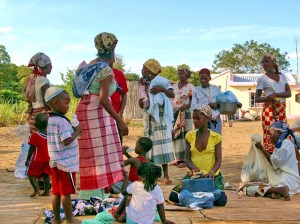UNFPA’S Dark View
 The new UN Population Fund report is riddled with problems which undercut its call for $8.1B a year for ever more contraception in developing countries. The evidence for this ambitious claim is so thin that it should not be hard for critics to refute it, but here are 11 problems that jumped off the very first pages:
The new UN Population Fund report is riddled with problems which undercut its call for $8.1B a year for ever more contraception in developing countries. The evidence for this ambitious claim is so thin that it should not be hard for critics to refute it, but here are 11 problems that jumped off the very first pages:
1. The report is based upon the claim that there is a “huge unmet need for family planning.” To the contrary, the term “unmet need” has been debunked by the very development experts who coined it. Particularly because the “huge” number–now claimed to be about 222 million–includes women who have specifically said they do not want the commodities.
2. The report says, “The power and means to determine the size of their families are scarce or inadequate.” In fact, studies confirm that development experts have found family programs ineffective precisely because couples do not use contraception when are already using other means to freely decide the number and spacing of children.
3. The report claims contraception is an “intrinsic right,” that is, a natural right that cannot be trumped by such rights as freedom of religion or conscience. Similarly, the executive director of UNFPA said in a letter to US UN ambassador Susan Rice last week that it was an “inalienable right.” This claim asserts that condoms are somehow on par with life, liberty, and the pursuit of happiness.
4. The report claims that this right is affirmed in human rights treaties. This too is unsubstantiated.
5. The report emphasizes the “forces” of “negative social pressure” which prohibit the use of contraception. Translation: religion and culture. The author of the report is in fact an activist whose organization specifically seeks to change social mores to promote this agenda.
6. The report promotes the elimination of “child marriage,” ostensibly any marriage under the age of 18, while at the same time promoting sex education for youth. While forced child marriage is nearly universally opposed at the UN, the report does not make that distinction, and does not sufficiently account for the benefits of marriage, and particularly sex inside marriage for women at the age of consent.
7. The report claims that “studies have shown that investing in family planning helps reduce poverty, improve health…enable adolescents to finish schooling and increase labor force participation.” In fact, studies also show that the opposite is true: schooling and better health care lead to lower fertility rates.
8. Additionally, authors of the study that is cited, the 1977 Matlab, Bangladesh study, have noted that it is incorrect to say that family planning was the sole reason for better life outcomes such as higher wages. There were many other subsidies such as health care and housing which contributed to the study’s results.
9. The report claims that “where family planning supplies, information and services are widely available, abortion rates are lower.” But the opposite has been shown to be true. In just one example, the CEDAW committee, which is by no means an opponent of widespread family planning and which has promoted abortion as a right over the years, has found just the opposite. In one instance, they admonished the government of France that where contraception rates rose among youth, unintended pregnancies and abortion rates also increased.
10. The bottom line of the report is the claim that nations which are struggling with the global economic downturn in their countries should pour another $8.1 billion dollars–every year–into already-well funded international family planning programs. This without any conclusive evidence that family planning programs reduce poverty or improve economies.
11. Most problematic of all, perhaps, is the troubling premise of the entire report, presented in its opening pages: “An unintended pregnancy can endanger a woman’s health, undermine her opportunities to earn a living and trap her and her entire family in a cycle of poverty and exclusion.”
Such a dark view of pregnancy–in which an innocent child, just because she is conceived unexpectedly, is a force for terrible evil– is radically out of step with the view of women all over the world who love their children, no matter whether they were expecting them or not.

